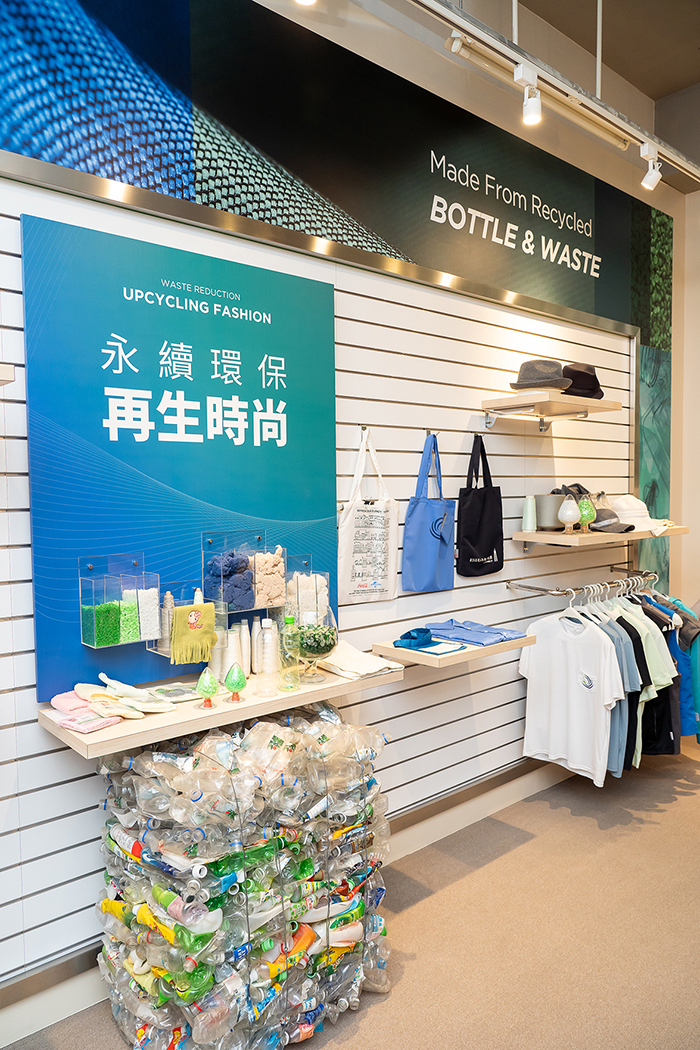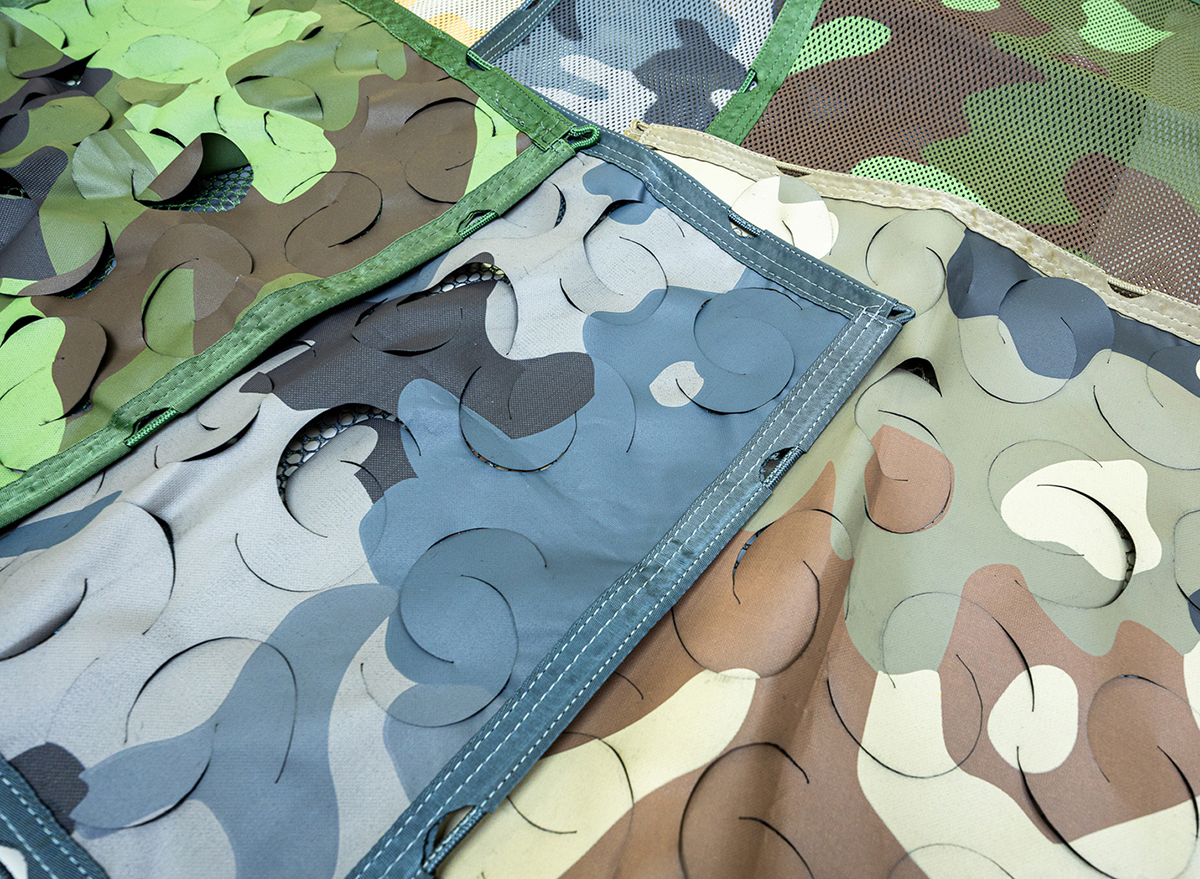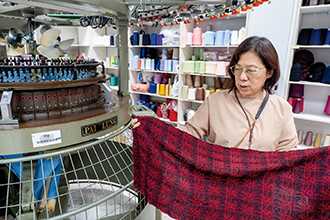Taiwan’s textile industry blends sustainability, innovation and smart technology. At 83, Alex Lo (羅忠祐) remains as forward-thinking as ever as...
Vous n'êtes pas connecté
Rubriques :
 - TAIWANTODAY.TW - Taiwan Review - 01/Aug 00:00
- TAIWANTODAY.TW - Taiwan Review - 01/Aug 00:00
Future Function
Taiwan spins its textile past into a high-tech tomorrow. Smart textiles are rapidly transforming the way we think about clothing by merging fashion with advanced technology. Garments, embedded with sensors and responsive fibers, are no longer just about aesthetics or basic functionality; they now actively monitor muscle activity, vital signs and environmental conditions to provide real-time data that enhances health, performance and comfort.A smart knee brace is embedded with sensors that monitor joint activity to track movement and aid rehabilitation. (Courtesy of Taiwan Smart Textile Association)With over 70 years of textile experience, Taiwan is uniquely positioned at the forefront of this revolution. The country’s textile industry, once centered on dyeing and spinning, has evolved into an innovation hub where high-precision laboratories and research centers are developing the next generation of intelligent fabrics. This blend of history and cutting-edge science, combined with Taiwan’s growing expertise in artificial intelligence (AI), creates fertile ground for smart textile breakthroughs. “People think of Taiwan as a subcontractor,” said Shen Chien-lung (沈乾龍), president of the Taiwan Smart Textile Association (TSTA). “What they don’t see is how deeply integrated our ecosystem has become.” Shen pointed out that Taiwan’s strength lies not only in textile manufacturing but in a vertically integrated value chain, from advanced yarn engineering to AI-enhanced product design. Today over 70 percent of the world’s functional fabrics incorporate technology from Taiwan, he added. Since TSTA’s establishment in 2018, Taiwan has built a global reputation in smart textile innovation. Shen explained that the association has woven together academia and industry through forums like the Taiwan Smart Textile Symposium. “We showcase member R&D; display progress at events like fitness expos, medical trade shows and Computex Taipei’s smart textile pavilion; and coordinate international exchanges with Japan, the U.S. and Europe,” he said. This integrated approach helps transform laboratory prototypes into market-ready products. Lee Kuei-chi (李貴琪), president of the Taiwan Textile Research Institute (TTRI), emphasized the unique advantages of Taiwan’s fully integrated upstream to downstream supply chain and R&D culture. “We combine high level textile know-how, biotechnology, AI and sustainability in one ecosystem,” Lee said. “Smart textile solutions are being designed for high-value sectors like performance sports, health care and even defense.”Singtex President Jason Chen presents a high-performance T-shirt made for the Ministry of National Defense using sustainable coffee yarn with moisture-wicking and quick-dry functions. (Photo By Chin Hung-hao)Integrated Intelligence At the forefront of this evolution is New Taipei City-headquartered Singtex Industrial Co. Founded in 1989 and originally known for high-performance outerwear fabrics, the company has emerged as a leader in textile engineering. Under President Jason Chen (陳國欽), it has invested in state-of-the-art laboratories and earned national accolades, including the prestigious Taiwan Excellence Award and Taiwan Accreditation Foundation certification. Researchers at Singtex develop next-generation yarns that incorporate eco-conscious materials. (Photo By Chin Hung-hao)According to Chen, environmental responsibility is the foundation of Singtex’s innovation strategy. This commitment gave birth to S.Cafe, a patented yarn that blends recycled coffee grounds with polyester fibers. “What we’re doing is embedding intelligence into the fabric’s DNA,” Chen said. The resulting product offers superior odor control, moisture management, deodorization and ultraviolet protection. Singtex’s tech is effective rather than flashy. Their yarn is engineered to draw heat away from the skin through a combination of capillary action and light-reflective structures embedded in the fiber, lowering the wearer’s perceived temperature in high-performance settings. It also integrates breathability and waterproofing into a single membrane layer that adapts to changes in temperature and humidity, maintaining comfort across a range of environments. These advanced functions are precisely what attract clients like The North Face, New Balance, Adidas, Patagonia, Hugo Boss and other leading global brands. Testament to Singtex’s quality is that it is a one-stop shop for Ministry of National Defense uniforms; the company researches, designs and produces combat uniforms, accessories and equipment cases using its durable, insulating, moisture-wicking fabrics. The company’s manufacturing arm is certified under ISO 27001:2022 to meet strict information security standards. More than a supplier, Singtex is increasingly becoming a systems integrator. Its smart dyeing facility, connected through the Internet of Things (IoT), gathers real-time data on temperature, dye absorption and energy use. The information powers a machine-learning model that fine-tunes the process for greater consistency and efficiency. The data also enables performance customization, letting clients define not only the fabric’s look and feel but also how it behaves. In partnership with the TTRI, Singtex has developed textiles that endure extreme temperatures and maintain performance over extended use. Recent defense projects include reengineering base layers with yarns that accelerate sweat evaporation and reduce heat fatigue in tropical climates, technologies that are now being considered for wider international deployment.Singtex produces performance fabrics tailored to daily wear, work wear, epidemic prevention and the military. (Photo By Chin Hung-hao)A stock of samples in diverse textures and hues reflects Singtex’s wide-ranging material research and custom design capabilities. (Photo By Chin Hung-hao)Digitized Development Another major smart fabric player is Taipei City-based NunoX, which specializes in photorealistic digital twins of fabrics to allow creators to visualize cloth behavior, fit and function without physical samples. Their premium scanner captures fabric details at 700 dots per inch, replicating weave, gloss, fiber direction and drape. AI-driven drape simulations enable virtual prototyping before production begins. “Digital cloth isn’t just a mirror, it’s an interface,” said company founder Jac Hsieh (謝賀祥). Users can design, manage and share digital fabric libraries through the company’s NX Cloud AI platform, and the next step is embedding the technology into Taiwan’s smart textile ecosystem. This workflow revolution was not built alone. NunoX collaborates closely with TTRI on fabric property databases. Electrical conductivity, stretch, compressibility and warmth retention are all incorporated into predictive AI models. Among the early adopters was Under Armour, which used NunoX’s technology to shorten shoe development time by 50 percent and reduce prototyping costs by 75 percent. More recently, the company was selected to join the NVIDIA Inception Program in recognition of its contribution to materials development. “This is about sustainability as much as speed,” Hsieh said. “There’s less waste, fewer errors and fewer sample runs.” By balancing fiber, form and firmware, they prove that software plays as significant a role as sewing in the future of textiles.NunoX is selected for the NVIDIA Inception Program for its potential to shape the future of smart fabric technologies. (Courtesy of NunoX)Jac Hsieh of NunoX shows how the company’s digital fabric database simulates textile properties like texture, drape and gloss in real time. (Photo By Chin Hung-hao)Forward Path Taiwan’s textile sector is driven by reinvention, forward-thinking strategy and progressive policy. What began with raw natural material processing has expanded into a dynamic ecosystem of finishing labs, AI-powered research and global collaboration, all rooted in a culture of integrating industry, design and technology. Looking ahead, the vision for the smart textile sector is ambitious and clear. Shen highlighted three priorities for the future: scale, sustainability and story. “Taiwan must construct narrative frameworks and solidify its position in global supply chains in addition to building sophisticated labs and creating intellectual property,” he explained. The ultimate goal is to establish Taiwan as the prime destination for global brands to source intelligent fabrics. A heated top features integrated circuits woven directly into the fabric to eliminate bulky components and enhance comfort and wearability. (Courtesy of TSTA)A model wears a smart dress with flexible e-paper displays that reflect ambient light and change visuals based on biometric inputs. (Courtesy of TSTA)To achieve this, TSTA is fostering cross-sector collaboration to bring together IoT companies, medical technology firms, defense integrators and universities. This collective push aims to create a vibrant ecosystem where design, technology and manufacturing converge, enabling local companies to stay ahead in the global smart textile race. “Innovation by innovation, Taiwan is emerging as a vital node in the global smart textile network,” Shen said. Write to Krakias Kai at kwhuang@mofa.gov.tw
Articles similaires
Weaving Resilience
Taiwan dominates supply chains in the burgeoning field of functional textiles. Each summer the Han Kuang military exercises take place across Taiwan....
Cutting Edge
Thoughtful design created with sustainable fabrics makes a positive impact on catwalks. Taiwan has built an international reputation for turning raw...
Cutting Edge
Thoughtful design created with sustainable fabrics makes a positive impact on catwalks. Taiwan has built an international reputation for turning raw...
Industry Redefined
The name Taiwan is synonymous with technology. Though it is best known for expertise in electronics, the country is a hidden champion in the global...
AFFOA To Host 2025 Advanced Functional Fabrics Summit In September
CAMBRIDGE, Mass. — August 6, 2025 — Advanced Functional Fabrics of America (AFFOA) is set to host its highly anticipated 2025 Advanced Functional...
Vice FM welcomes allies’ permanent representatives to UN
Vice Foreign Minister Ger Bau-shuan vowed that Taiwan will continue to advance the national development of allied nations through integrated diplomacy...
Outward Momentum
A sophisticated performance venue offers global dance professionals a platform to browse the Taiwan zeitgeist. The Taiwan Dance Platform (TDP)...
Outward Momentum
A sophisticated performance venue offers global dance professionals a platform to browse the Taiwan zeitgeist. The Taiwan Dance Platform (TDP)...
Foreign Minister Lin attends MedInfo 2025 in Taipei
Minister of Foreign Affairs Lin Chia-lung attended the opening ceremony of the 20th World Congress on Medical and Health Informatics Aug. 10 in Taipei...
Les derniers communiqués
-
COMPUTEX 2025: MiTAC Powers Sustainable AI Data Centers with New Server & Cooling Tech
MiTAC Computing Technology Corp - 24/05/2025




